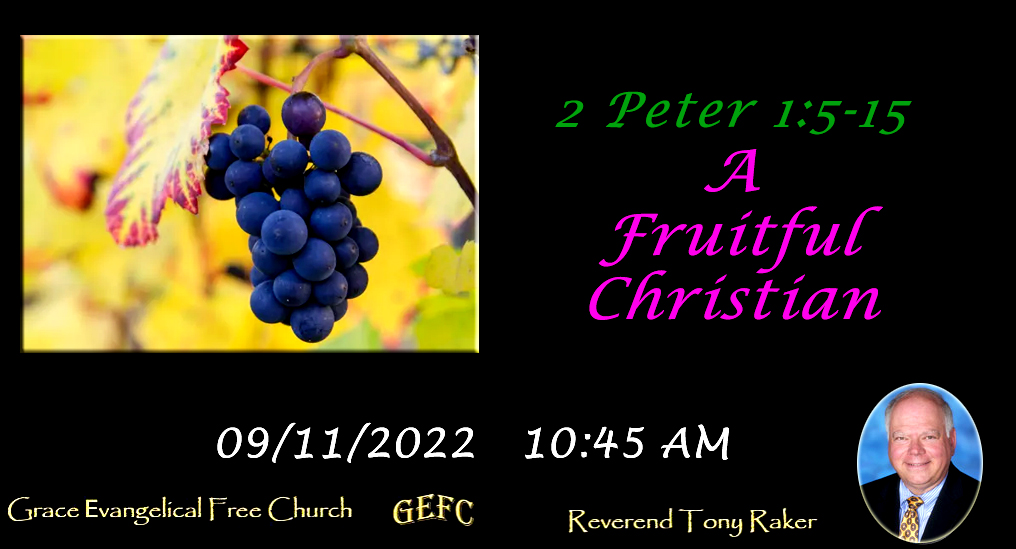
2 Peter 1:5-15 A Fruitful Christian
2 Peter 1:5-15 A Fruitful Christian
In 2 Peter 1:5-11 we are given very clear guidance about becoming fruitful Christians. The argument which Peter places before us is this: God has done His part in giving us the gift of faith (v. 1), in bringing usu to a knowledge of Himself (vv. 2-3), and in making us a partaker of His divine nature (v. 4); now we must do our part, and we will become fruitful Christians.
- Contextual/Comparison: God keeps His Word: God continually uses His Word. 5-7 tell us that we must exercise our faith by adding to ourselves seven virtues or graces. God has given us the gift of faith, and on this foundation and by using this gift we must add:
- VIRTURE (V. 5)
This means ‘moral excellence’ or ‘good character’. Compare Acts 11:24, but notice this: it is a robust goodness, a quality that is vigorous and strong – something which is greatly needed in our churches: men and women who are those of genuine and virile Christian character.
- KNOWLEDGE (V. 5)
This means ‘wisdom’ in the sense of knowing how to act as a Christian in relationships and duties of life. If we need counsel there are some friends to whom we can gladly go to seek such counsel, and we go to them because they have knowledge and wisdom; they know what to advise and how to act and they have spiritual intelligence; but we do not have to go to man to get such knowledge and wisdom per Psalm 32:8 and Proverbs 2:6.
- SELF-CONTROL (V. 6)
If we are characterized by this virtue, it means that our desires will be under the Lord’s mastery and control, and not only those, but our judgments, tastes, speech and everything else. This is what it means to be “filled with the Spirit” (Ephesians 5:18). There is a special reference here to the mastery of sexual desires, which are very strong in any normal and healthy person; they are God’s gift but must be brought under and kept under control, requiring discipline. Does your body master you, or are you master of your body?
- PERSEVERANCE (V. 6)
This is meant to convey the idea of endurance. The Christian pilgrimage is a very hard one, and as we travel on to Glory we are to “…endure hardship…like a good soldier of Christ Jesus” (2 Timothy 2:3); compare James 1:2-6 and 12. We are to be people of grit as well as grace (Hebrews 11:27 and 32-38).
- GODLINESS (V. 6)
This is the old-fashioned word we know best as piety, or reverence, referring to a quality which is very much needed today. There is no suggestion of being sad and somber, but we are to be characterized by a sanctity and a seriousness: a Christ-likeness (1 Timothy 2:2; 4:7-8 and 6:3,5,6,11). There is a beautiful illustration of godliness in action in 2 Kings 4:8-10. Do others perceive that we are holy, godly and Christ-like? (Acts 4:13)
- BROTHERLY KINDNESS (V. 7)
The word is ‘philadelphia’, which means ‘brotherly affection’. We as Christians are to develop kindness to those who are our brothers and sisters in Christ (Galatians 6:10, and compare 1 Peter 3:8-9). What scope there is for exercising this grace!
- LOVE (V. 7)
This should be the great characteristic of every Christian, and if we want to know what love is and how it is expressed, all we have to do is to read 1 Corinthians 13. It means that we should not only love the people of God, but love all people.
These are the seven graces that we, through the exercising of faith, should constantly be adding to our lives, and we shall become fruitful Christians. What will be the result of the adding of these seven graces:
2 Peter 1:8: “For if these qualities are yours and are increasing, they keep you from being ineffective or unfruitful in the knowledge of our Lord Jesus Christ.”
- Grammatical Usage: “are yours” or in the Greek, “huparchó” meaning, “in your possession/being”; “increasing” or “pleonazó” meaning, “superabound; abundance to excess”; “ineffective” or “argos” meaning, “thoughtless, complacent; unprofitable, injurious”; “unfruitful” or “akarpos” meaning, “profitless”.
- Literal Interpretation: “If you possess these qualities as part of your very being, in fact abounding in excess, then it means that knowing our Lord Jesus Christ has not made your lives complacent, unproductive or in fact injurious.”
(1) We shall no longer be barren and unproductive, but increasingly fruitful, especially in the knowledge of God – see v. 8.
(2) We shall no longer be blind, but spiritually enlightened – see the first part of v. 9.
(3) We shall no longer be forgetful of all that the Lord has done for us, but we shall be constantly filled with gratitude to Him for His grace to such unworthy people as ourselves – see the second part of v. 9.
(4) We shall no longer be likely to stumble spiritually, but we shall be “strong in the Lord and in his mighty power” (Ephesians 6:10) – see v. 10.
(5) We shall not suffer loss, but we shall receive a reward at the Judgment Seat of Christ (1 Corinthians 3:10-15) – see v. 11.
Heritage: V. 15GEVFREE – 2 Peter 1 vv 5 to 15 A Fruitful Christian
“A good man leaves an inheritance to his children’s children” (Pr. 13:22). Everyone should live for a heritage that is spiritual and everlasting (Jn. 3:16–18), garnering heavenly rewards (Rev. 22:12), securing citizenship in heaven (Phil. 3:20). God gave His Son to purchase our salvation (2 Cor. 5:21), providing the ability and opportunity to invest our lives for Him, then rewards us for doing so (Rev. 21:7)! We live in light of our great heritage (Colossians 3:23–24), setting an example now and forever more.
- Conclusion: If you died right now, what would be your heritage?
